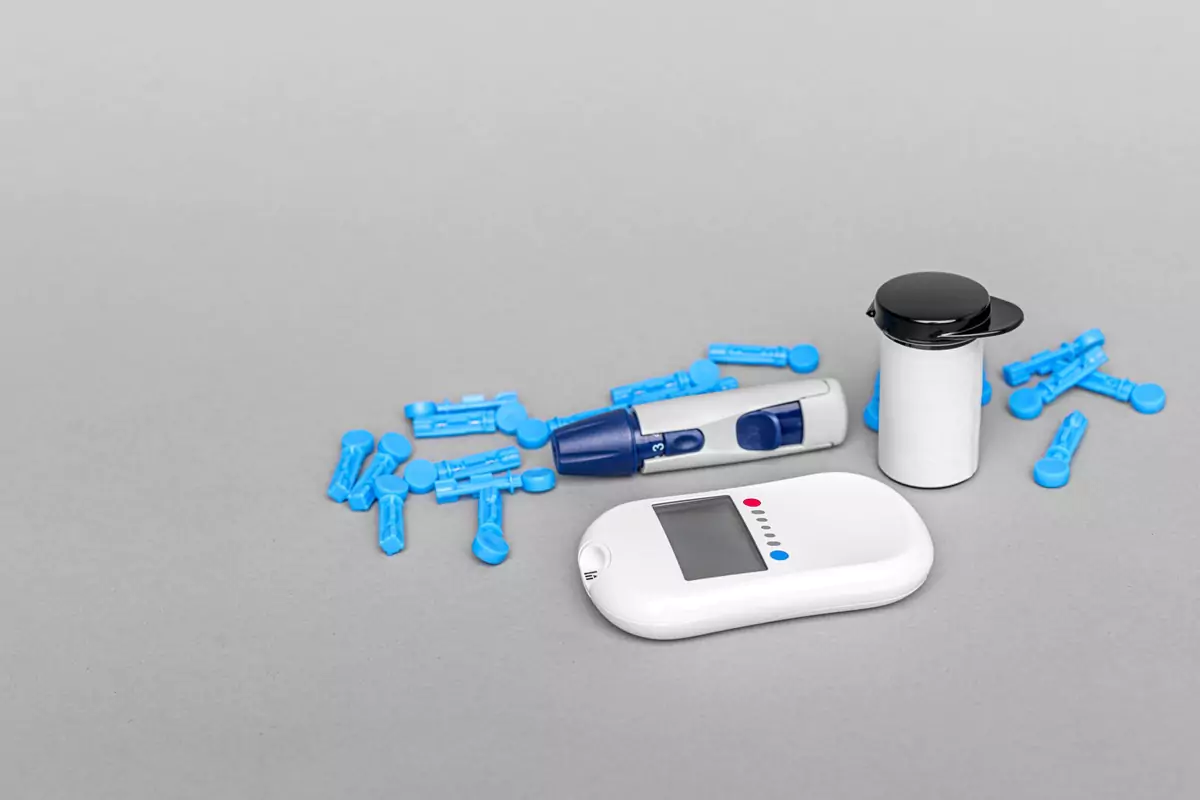






Identify the Most Common Symptoms of Insulin Resistance


Table of Contents
- What are the Symptoms of Insulin Resistance?
- What are the Symptoms of Insulin Resistance in Females?
- What are the Symptoms of Insulin Resistance in Males?
- What are the Signs of High Insulin?
- What are the Low Insulin Levels Symptoms?
- What is the Treatment for Insulin Resistance?
- SugarMD Weight Loss Formula
- What are the Medications for Insulin Resistance?
- Conclusion
- About The Author
When it comes to understanding the body and staying healthy, it’s important to recognize the signs and symptoms of different illnesses and diseases. Insulin resistance is one of those conditions that are often overlooked, yet it can have a significant impact on your wellbeing. What is insulin resistance? It occurs when your body is not able to effectively use the hormone insulin to turn glucose (sugar) into energy.
This can lead to a build-up of glucose in your blood which can cause serious health issues. When your body is unable to use insulin properly, it begins to produce more insulin than normal. This extra insulin can cause a variety of symptoms, including weight gain, fatigue, difficulty concentrating, headaches, high blood sugar and high blood pressure.
While the symptoms of insulin resistance vary from person to person there are some common signs that can help you identify the condition. It is important to be aware of the symptoms of insulin resistance as they can be an indication that the body is not functioning properly.
What are the Symptoms of Insulin Resistance?
Insulin resistance is a medical condition that affects the body's ability to use insulin. Symptoms of insulin resistance vary from person to person but there are some common symptoms that can help you identify the condition. It is important to be aware of the symptoms of insulin resistance in order to get an accurate diagnosis and treatment plan. Weight Gain: Weight gain can be one of the signs of insulin resistance. People with insulin resistance tend to gain weight more easily.
If you are gaining more than five to ten pounds without significant changes in your diet or exercise habits, this may be a sign of insulin resistance. Fatigue: Insulin resistance can cause a person to feel tired and weak. This is because the body is unable to use the insulin properly, leading to fatigue. People may also find it difficult to concentrate and have trouble completing even simple tasks. Headaches: Headaches can be a sign of insulin resistance.
These headaches are usually throbbing and can last for hours. If you experience frequent headaches, it may be a sign of insulin resistance. High Blood Sugar: People with insulin resistance may have higher blood sugar levels than normal. This can be due to the body not processing insulin properly. If you have persistently elevated blood sugar levels, it could be a sign of insulin resistance.
High Blood Pressure: High blood pressure is another symptom of insulin resistance. This is because the body is not able to process the insulin properly, leading to an elevated blood pressure. If you have high blood pressure, it may be a sign of insulin resistance.
These are the most common symptoms of insulin resistance. If you are experiencing any of these symptoms, it is important to speak to your doctor. They can help you determine if you have insulin resistance and provide a treatment plan to manage the condition.
What are the Symptoms of Insulin Resistance in Females?
Insulin resistance can affect both men and women but there are certain signs and symptoms that are more common in women. If a woman is experiencing any of these symptoms, it is important to seek out medical advice and to get tested for insulin resistance.
Weight Gain: One of the most common symptoms of insulin resistance in women is weight gain, particularly around the abdomen and hips. Although this can be caused by various factors, it is especially common in women with insulin resistance.
Difficulty Concentrating: Difficulty concentrating is another symptom of insulin resistance in women. This can manifest itself in the form of brain fog or an inability to focus on tasks for an extended period of time. Excess Facial and Body Hair: Another symptom of insulin resistance in women is excess facial and body hair. This can be caused by increased levels of testosterone which is a hormone that is often elevated in women with insulin resistance.
Acanthosis Nigricans: Acanthosis nigricans is a condition in which dark patches of skin appear on the neck, armpits and other parts of the body. It is a sign of insulin resistance and can be a warning sign of other metabolic disorders. Polycystic Ovarian Syndrome (PCOS): PCOS is a condition that affects the ovaries and is often linked to insulin resistance. Women with PCOS may experience irregular periods, fertility issues and obesity.
High Levels of Insulin: High levels of insulin in the body can indicate insulin resistance. Women with high levels of insulin are more likely to develop type 2 diabetes. Acne: Acne is a common symptom of insulin resistance in women.
Increased insulin levels can lead to an increase in sebum production which can lead to breakouts. These are some of the common symptoms of insulin resistance in women.
It is important to be aware of them and to seek medical advice if you are experiencing any of these symptoms. Treatment for insulin resistance can vary depending on the individual but can include medications, dietary changes and exercise.
What are the Symptoms of Insulin Resistance in Males?
Insulin resistance is a medical condition that affects the body’s ability to use insulin and its symptoms vary from person to person. However some common symptoms of insulin resistance in males can help them to identify the condition.
It is important to be aware of the symptoms of insulin resistance in order to get an accurate diagnosis and treatment plan. High Triglycerides: Triglycerides are a type of fat found in the blood and high levels can be a sign of insulin resistance.
High triglycerides levels can increase the risk of heart disease and stroke so it’s important to keep an eye on them. Low Testosterone Levels: Low testosterone levels can be a sign of insulin resistance in males. This is because elevated levels of insulin can interfere with the production of testosterone, resulting in symptoms such as decreased libido, erectile dysfunction and fatigue. Erectile Dysfunction: Erectile dysfunction can be a sign of insulin resistance in males.
This is because high levels of insulin can interfere with the proper functioning of the blood vessels, preventing blood from flowing to the penis. High Blood Pressure: High blood pressure is another common symptom of insulin resistance in males. This is because high levels of insulin can cause the body to retain fluid, resulting in an increase in blood pressure. These are some of the most common symptoms of insulin resistance in males.
If you notice any of these symptoms, it is important to speak to your doctor for an accurate diagnosis and treatment plan. It is important to take your insulin resistance seriously and to be aware of the symptoms so you can get an accurate diagnosis and treatment plan. With the right lifestyle changes and medications, you can effectively manage your insulin resistance and reduce its related symptoms.
What are the Signs of High Insulin?
High levels of insulin in the body can be a sign of insulin resistance and there are some common symptoms that can easily be identified. One of the most common signs of high insulin is increased appetite.
People with high insulin levels often experience hunger more frequently than usual, even after they have just eaten. They may also experience fluid retention which can cause bloating and swelling in the abdomen and feet. Headaches are another symptom of high levels of insulin.
People with high insulin levels may experience headaches that can range from mild to severe. They may also experience a rapid heartbeat and palpitations as well as nausea and other gastrointestinal issues.
These symptoms can be a sign of insulin resistance and should be discussed with a healthcare professional. High insulin levels can also cause low blood sugar which can lead to fatigue, weakness and dizziness. People with insulin resistance may experience hypoglycemia, where their blood sugar levels are too low.
This can lead to a feeling of weakness and fatigue that can last for hours or even days. Excessive sweating and trembling can also be a sign of high insulin levels. People with insulin resistance may also experience other symptoms related to their weight. They may gain weight quickly, even when their caloric intake is not significantly increased. They may also experience difficulty concentrating and have difficulty focusing on tasks or conversations.
High insulin levels can cause the body to become resistant to the hormone, leading to a variety of symptoms. If you are experiencing any of these symptoms, it is important to see a doctor to get an accurate diagnosis and treatment. With the right treatment, you can manage your insulin levels and reduce your risk for developing diabetes and other health complications.
What are the Low Insulin Levels Symptoms?
Low insulin levels are typically associated with type 1 diabetes and can also occur in people with type 2 diabetes who are not properly managing their condition. Low insulin levels can cause a variety of symptoms that can affect your health and well-being. Fatigue is one of the most common symptoms of low insulin levels. When your body does not have enough insulin, it is unable to utilize glucose for energy which can cause fatigue.
This can manifest itself as a general feeling of tiredness or even exhaustion and a lack of energy. You may also find it difficult to stay alert or concentrate on tasks. Weakness is another symptom of low insulin levels. As your body is not able to use the glucose in your bloodstream for energy, it may start to take energy from other sources such as muscle tissue. This can cause a feeling of weakness or a lack of strength in your muscles.
Excessive sweating is another symptom of low insulin levels. As your body struggles to use the glucose in your bloodstream for energy, it may cause an increase in your body temperature, resulting in excessive sweating. Dizziness is another common symptom of low insulin levels. As your body is not able to use the glucose in your bloodstream for energy, it can cause low blood sugar which can lead to dizziness, lightheadedness and even fainting.
Hypoglycemia is another symptom of low insulin levels. As your body is not able to use the glucose in your bloodstream for energy, it can cause low blood sugar levels which can result in a range of symptoms, including confusion, shakiness and even loss of consciousness.
Low insulin levels can have a range of symptoms that can affect your health and well-being. If you suspect you are experiencing low insulin levels, it is important to speak to your doctor as soon as possible to get an accurate diagnosis and treatment plan.
What is the Treatment for Insulin Resistance?
The primary goal of treatment for insulin resistance is to reduce the risk of developing type 2 diabetes, heart disease and stroke. Insulin resistance can be treated with medications, dietary changes, exercise, insulin therapy and weight management. Making lifestyle changes and addressing underlying health conditions can also help Dietary Changes Nutrition plays an important role in managing insulin resistance.
Eating a healthy diet that includes a variety of fruits, vegetables, lean proteins, whole grains and healthy fats can help reduce insulin resistance. Limiting processed foods and refined carbohydrates can also help reduce insulin resistance. Consuming a diet low in sugar and high in fiber can help reduce blood glucose levels and improve insulin sensitivity. Exercise Regular exercise can help reduce insulin resistance and improve blood glucose control.
Exercise helps the body use insulin more efficiently and can also help reduce stress and improve overall health. Aim for 30 minutes or more of physical activity per day, including both cardiovascular activities and strength training. Insulin Therapy If diet and exercise are not enough to reduce insulin resistance, insulin therapy may be necessary. Insulin therapy involves giving the body insulin to help manage blood sugar levels.
It is usually reserved for people with type 2 diabetes but can also be used to treat people with insulin resistance. Weight Management Maintaining a healthy weight is essential for managing insulin resistance.
Losing weight can help reduce insulin resistance by improving the body’s ability to use insulin. Eating a balanced diet and exercising regularly can help you reach and maintain a healthy weight. Talk to your doctor about setting a weight management plan that is right for you.
SugarMD Weight Loss Formula
This is the ultimate fat burner that has been recently improved to help you achieve your weight loss goals faster and more efficiently than ever before. This powerful formula is specially designed to target stubborn body fat and accelerate your metabolism, allowing you to burn calories and shed unwanted pounds quickly and safely.
Its unique blend of natural ingredients works together to suppress your appetite, increase your energy levels and enhance your overall wellbeing. With SugarMD Weight Loss Formula, you can enjoy a healthier and happier lifestyle, free from the burden of excess weight. Whether you are looking to lose a few pounds or transform your entire physique, this revolutionary product can help you reach your desired results in no time.
Making lifestyle changes such as dietary changes, exercise and weight management can help reduce insulin resistance and improve overall health. If lifestyle changes are not enough, medications, insulin therapy and other treatments may be necessary. It is important to talk to your doctor to determine the best treatment plan for you.
What are the Medications for Insulin Resistance?
When it comes to managing insulin resistance and improving overall metabolic health, medication can be a useful and beneficial tool. There are several medications available to help manage insulin resistance as well as promote weight loss. Metformin is one of the most commonly prescribed medications for insulin resistance and weight loss.
It works by reducing glucose production in the liver and increasing the body’s sensitivity to insulin. It can also help with weight loss by increasing the number of calories burned by the body. Sulfonylureas are another type of medication used to manage insulin resistance and weight loss. They work by reducing the amount of glucose released by the liver and increasing the amount of insulin released by the pancreas.
They can also help with weight loss by increasing the number of calories burned by the body. GLP-1 receptor agonists are a type of medication used to treat type 2 diabetes. They work by increasing the amount of insulin released by the pancreas and decreasing the amount of glucose produced by the liver. They can also help with weight loss by increasing the number of calories burned by the body. DPP-4 inhibitors are a type of medication used to treat type 2 diabetes.
They work by blocking the action of the enzyme DPP-4 which helps to reduce the amount of glucose released into the bloodstream. They can also help with weight loss by increasing the number of calories burned by the body. Weight loss medications can be a useful tool for managing insulin resistance and improving overall metabolic health.
It is important to talk to your doctor about the best medication for your particular situation as some medications may have side effects or interact with other medications. Your doctor will be able to help you choose the best medication for you and provide guidance on how to use it safely and effectively.
Conclusion
Insulin resistance is a medical condition that affects the body’s ability to use insulin. It’s a serious condition that can lead to long-term health problems if left untreated. Symptoms of insulin resistance can vary from person to person but there are some common symptoms that can help you identify the condition. It is important to be aware of the symptoms of insulin resistance in order to get an accurate diagnosis and treatment plan.
It’s important to be proactive in identifying the symptoms of insulin resistance and seeking appropriate treatment. An early diagnosis and effective treatment plan can help to reduce the risk of long-term health complications and improve overall health and well-being. It’s important to follow the treatment plan prescribed by your doctor in order to achieve the best results.
About The Author
Meet Dr. Ahmet Ergin a highly skilled and dedicated endocrinologist with a passion for diabetes care. Dr. Ergin earned his medical degree with honors from Marmara University in Istanbul. He completed internal medicine residency and endocrinology fellowship at Cleveland Clinic.
Dr. Ergin is board-certified in Internal Medicine, Endocrinology, Diabetes and Metabolism due to his vast medical expertise. He's a certified diabetes educator, author of "The Ultimate Diabetes Book," and founder of "the SugarMD YouTube channel." Dr. Ergin offers exceptional diabetes care to his patients in Port Saint Lucie, FL, helping them manage effectively.
Disclaimer: These statements have not been evaluated by the Food and Drug Administration. Information on this website isn’t intended to treat, cure or prevent any disease. Discuss with your doctor and do not self-treat.
Written By Dr. Ahmet Ergin
456 total articles
Meet Dr. Ahmet Ergin, a highly skilled and dedicated endocrinologist with a passion for diabetes care. Dr. Ergin earned his medical degree with honors from Marmara University in Istanbul. He completed internal medicine residency and endocrinology fellowship at Cleveland Clinic. Dr. Ergin is board-certified in Internal Medicine, Endocrinology, Diabetes, and Metabolism due to his vast medical expertise. He's a certified diabetes educator, author of “The Ultimate Diabetes Book,” and founder of “the SugarMD YouTube channel.” Dr. Ergin offers exceptional diabetes care to his patients in Port Saint Lucie, FL, helping them manage effectively. For a closer look into his insights and experiences, connect with Dr. Ahmet Ergin on LinkedIn, Instagram, and YouTube.”
Disclaimer: These statements have not been evaluated by the Food and Drug Administration. Information on this website isn't intended to treat, cure or prevent any disease. Discuss with your doctor and do not self-treat.
Products









